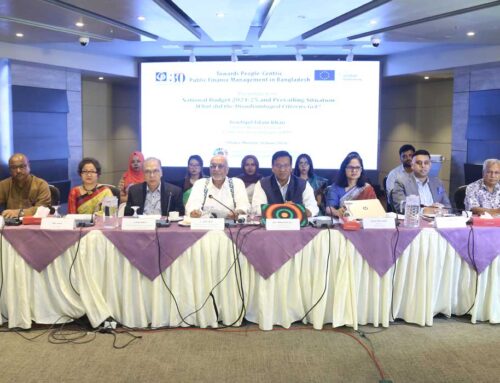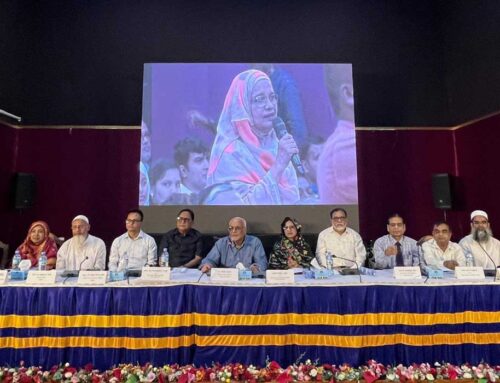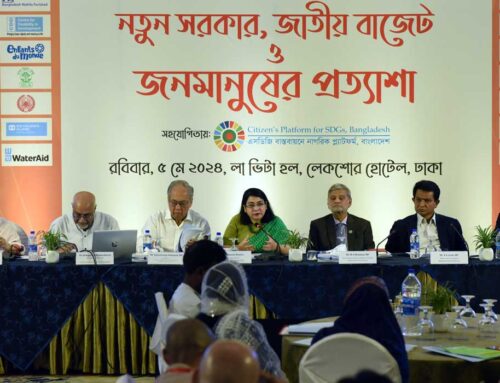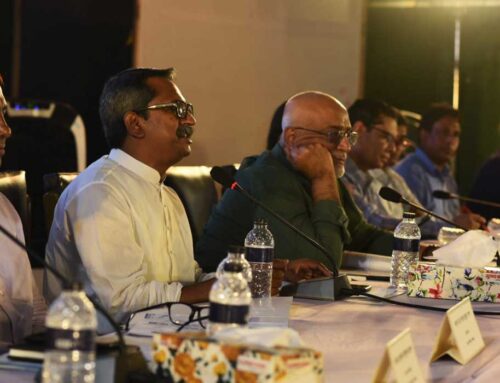
People are more interested in resolving petty disputes at the local level due to delays, harassment, and money spending in court cases. Conciliation of Dispute (Municipal areas) Board Act, 2004 is more often used by peoples who want to settle petty disputes and not seek help from the court to save money and reduce harassment. Similarly, village courts resolve petty disputes of the people at the union level. Although, there is no such law for about 20 million people living in 12 city corporations of the country. Therefore, the new law is needed to settle petty disputes at the city corporation.
These opinions emerged at a virtual discussion session on “City Court Act: Proposed Outline and Possibility of Implementation”, organised jointly by the Madaripur Legal Aid Association (MLAA; the Citizen’s Platform for SDGs, Bangladesh; Bangladesh Legal Aid and Services Trust (BLAST) and Nagorik Uddyog held virtually on 10 October 2020.
httpv://www.youtube.com/watch?v=xFUkO7GUD9g/
Mr Khan Mohammad Shahid, Chief Coordinator, MLAA made the keynote presentation. He pointed that, there are around 36 lakh cases still pending at different level. The number of cases against one judge in Bangladesh is around 1883. The number of judges for each one lakh citizen is about 0.73. As a result, the city residents face financial losses, harassment and various adversities and there are also delays in settling small disputes in the courts.
Local settlement of petty disputes can be an easier and quick resolution of certain disputes in every city corporation’s jurisdiction. As of now, no law has been enacted to resolve petty disputes between citizens in the city corporation areas. People in the city have to go to court for small cases and wait at least two years to resolve it.
Mr Z I Khan Panna, Advocate, Bangladesh Supreme Court, thinks that the use of the term “city court” involves various processes, including judges and lawyers’ appointment. He also stated that many people abuse the village courts or local courts by filing false cases. So, while formulating laws, these issues should be addressed as well. Professor Tofail Ahmed, local governance expert, agreed with the statement, saying the process should be considered as an alternative dispute resolution system.
Architect Mr Iqbal Habib, thinks that local level dispute resolution will play a big role in urban management. Since there is a shortage of human resource in large city corporations, to ensure inclusive urban benefits, city courts will create opportunities for equitable and social services through a participatory process to ensure justice. He also stated that the city courts can help build an environment-friendly atmosphere in city corporations since it can be used as a tool to monitor city dwellers’ behaviors.
Mr Fazlul Haque, Secretary, MLAA, gave examples of dispute resolution at local level and explained why a law is required to settle disputes in the city corporation areas. Mr Zakir Hossain, Chief Executive, Nagorik Uddyog, also highlighted that to ensure people’s access to justice and overall rethinking of governance system is required.
Dr Debapriya Bhattacharya, Convenor of Citizen’s Platform for SDGs, Bangladesh, Distinguished Fellow, Centre for Policy Dialogue (CPD) and Chairman, Madaripur Legal Aid Association chaired the dialogue. Dr Bhattacharya stated that if Bangladesh manages to formulate a City Court Act and ensure speedy implementation of the law, it will ease the process of delivering civic amenities to city dwellers.
The discussion session was attended by legal experts, academicians, human rights activists, NGO workers and journalists.





